Air Operations, Carolines During the night, 868th Heavy Bomb Squadron SB-24s attack Japanese airfields and defenses in the Palau Islands.
[  | |   ] ]
Air Operations, CBI
BURMA
- More than 70 10th Air Force fighter-bombers attack numerous targets throughout northern Burma.
- 12 14th Air Force B-25s attack Kutkai.
CHINA
- Nearly 100 14th Air Force P-51s and P-40s attack shipping, motor vehicles, troops, horses, artillery, warehouses, dumps, and targets of opporunity across east-central China.
- 35 P-40s attack Hsenwim (Burma), Lungling, Tengchung, and Tingka.
FRENCH INDOCHINA
- 4 14th Air Force P-40s attack shipping off Hongay and Nam Dinh.
[  | |   ] ]
Air Operations, Europe
RAF BOMBER COMMAND
Daylight Ops:
- 1,004 aircraft attack 9 airfields in Belgium and Holland in preparation for a night offensive against German troops. Included in the aircraft total are 599 Lancasters, 385 Halifaxes, 19 Mosquitos and 1 Lightning. Visibility is good and all raids are classified as successful.
- 1 Wellington flies and RCM sortie.
Evening Ops:
Minor Ops:
- 32 Mosquitos are sent to Berlin, 8 to the Venlo airfield and 9 to various Ruhr targets, 6 Halifaxes lay mines off La Pallice, and there are 7 Mosquito patrols and 1 RCM sortie.
US 8th AIR FORCE
BELGIUM:
- 59 3rd Bomb Division B-24s attack the Florennes/Juzaine Airdrome.
- 33 VIII Fighter Command P-47 fighter-bombers attack rail targets at Braine-le-Comte.
- 1 p-47 is lost with its pilot
GERMANY:
- 211 1st Bomb Division B-17s and 312 2nd Bomb Division B-24s, escorted by a total of 175 VIII Fighter Command fighters, attack eight airdromes.
- 13 heavy bombers are lost
- 184 3rd Bomb Division B-17s, escorted by 118 VIII Fighter Command P-51s, attack two airdromes.
NETHERLANDS:
- 104 3rd Bomb Division B-17s attack the Venlo Airdrome.
- P-38 pilots of the 479th Fighter Group's 434th Fighter Squadron down 3 Bf-109s over the Steenwijk Airdrome at 1315 hours.
US 9th AIR FORCE
FRANCE:
- In northern France, more than 330 IX Bomber Command B-26s and A-20s attack coastal defenses at St.-Malo, rail bridges, a marshalling yard, fuel and ammo dumps.
- 9th Air Force fighters and fighter-bombers provide direct support for US Army divisions in the battle area.
- XIX TAC fighters down 13 Luftwaffe fighters over France between 0735 and 1645 hours.
Operation DRAGOON
FRANCE:
- The invasion of southern France begins with and airborne drop of 5,100 British and American paratroopers from 396 Provisional Troop Carrier Division C-47 between 0423 and 0514 hours.
- From 0550 hours onward, Allied fighters arrive oer the beach to strafe targets of opportunity and protect scores of small formations of fighters and medium and heavy bombers dispatched against specific targets.
- At 0800 hours, by which time destruction of preliminary objectives has been undertaken by air and naval forces and the capture of preliminary objectives on the ground has been achieved by American and British paratroopers as a means to isolate DRAGOON invasion area, three US Army divisions of the US 7th Army land from the sea between Toulon and Nice.
- Finally, beginning at 0814 and ending at 1907 hours, three separate waves of towed gliders deliver 9,000 Allied airborne soldiers to the beachhead area along with 213 artillery pieces, 221 light vehicles, nearly 760,000 rounds of ammunition, nearly 1,300 gallons of gasoline about 57,000 pounds of rations, and nearly 750,000 pounds of assorted other goods and supplies.
- The airborne operation is virtually flawless, In 1,394 aircraft and glider sorties on D-day, 11 troop carrier groups--4 from the 12th Air Force and 8 on loan from the 9th Air Force--experience only two aborts due to mechanical failures, the premature release of only two paratroop loads and nine gliders, and missed drop zones by only 36 planeloads of paratroopers.
- In 746 glider landings, pilot losses are an extremely low 11 killed, 4 missing, and 16 injured
US 12th AIR FORCE
FRANCE:
- 12th Air Force medium bombers provide general support for the invasion by attacking coastal defenses, troop positions, artillery batteries, lines of communication, and numerous other targets throughout the invasion area. During the course of the day, from 0445 until 1618 hours, 42nd Medium Wing B-26s alond conduct 353 sorties, first against beach-defense positions and later against road and rail bridges west of Toulon.
- XII TAC A-20s attack a German Army barracks in the invasion area.
- 12th Air Force fighters and fighter-bombers patrol the invasion area and attack a broad range of ground targets.
- During the night, XII TAC A-20s attack motor vehicles and light sources in the Rhone River valley north of the DRAGOON beachhead area.
US 15th AIR FORCE
FRANCE:
- Fighters of the 15th Air Force's 306th Fighter Wing that are temporarily based in Sardinia support the DRAGOON landings at the beachhead and with farther-ranging attacks on German lines of supply in the Toulon area.
- 15th Air Force B-17s and B-24s also take part in a variety of tactical-type missions aimed at cutting the German lines of supply and communication.
[  | |   ] ]
Air Operations, East Indies - V Bomber Command B-24s attack the Lolobata airfield on Halmahera.
- B-25s attack shipping near Ternate Island.
- Various 5th Air Force aircraft attack targets of opportunity on Ceram and Tanimbar islands.
[  | |   ] ]
Battle of the Atlantic U-618 is surfacing when she is picked up by the radar of Liberator 'G' of No 53 Squadron. The U-boat is illuminated with the aircraft's Leigh Light. 6 depth charges are dropped and an explosion and fire from aft of the conning tower is observed. No wreckage is seen, but oil is seen in the area of the attack a short time later.
U-618|
| Class | Type VIIC |
| CO |
Oberleutnant zur See Erich Faust |
| Location |
Bay of Biscay, W of St Nazaire |
| Cause |
Air attack/depth charge |
| Casualties |
51 |
| Survivors |
None |
[  | |   ] ]
Eastern Front German defenders block the Russians attempting to break through the Carpathian mountain passes.
[  | |   ] ]
English Channel U-741 had just attacked Convoy FTC-68 and was seeking refuge on the bottom after firing when the British corvette Orchis makes contact with her. The ship makes two attacks with depth charges and another with her Hedgehog after which there is a loud explostion followed by the appearance of large quantities of oil.
U-741|
| Class | Type VIIC |
| CO |
Oberleutnant zur See Gerhard Palmgren |
| Location |
English Channel, SE of St Catherine's Point |
| Cause |
Depth charge |
| Casualties |
48 |
| Survivors |
1 |
[  | |   ] ]
Italy The British 8th Army begins a large-scale shift of units to the eastern flank in preparation of an assault on the Gothic Line.
[  | |   ] ]
Mediterranean The US destroyer Somers (DD-381) sinks the German ship Esebart and damages the corvette UJ-6083. The latter is captured and then scuttled southwest of Isle Port Cros.
[  | |   ] ]
New Guinea On Noemfoor, the Japanese succeed in withdrawing the main force of some 200 toward Pakriki, on the south central coast, from Hill 380, during the night of the 15th.
On Biak, the 162nd and 163rd Regiments split the enemy remnants on the island, as they make contact on the Sorido-Korim Bay track.
In the Aitape area, the Tadji Defense Perimeter and Covering Force, consisting of the 43rd Division and the Cavalry 112th RCT, under the command of Maj-Gen Leonard F. Wing, who also commands the 43rd Division, takes over the mission ot the PERSECUTION Covering Force and the latter is dissolved.
In the Wakde-Sarmi area, the 31st Division, less the 124th RCT, arrives.
In the Vogelkop area, ALAMO Force warns TF TYPHOON that an enemy force of about 250 has been moving along the northern coast from Manokwari to Sorong. src="rtarrow1.jpg" height="14" alt="rarr"> ] ]
Occupied France There is an uprising against the Nazi occupation of Paris as 20,000 gendarmes go on strike and capture 700 Germans.
[  | |   ] ]
Southern France Allied forces land in southern France between Toulon and Cannes. This is Operation DRAGOON, originally and for the most of the planning stage, known as ANVIL. The code name has been changed because it is believed that the Germans have discovered it and its significance. The landing forces are from Gen Alexander M. Patch's US 7th Army. Lucian Truscott's VI Corps provides the 3 divs that make up the bulk of the assault force. The follow-up formation is Gen Jean de Lattre's II French Corps. French commando units also land from the sea in the first wave and there is also an airborne attack. This involves 5,000 men from a composite parachute group and they drop inland near Le Muy. Before these or the seaborne force go in there are attacks by 1,300 land-based aircraft and naval shelling. Adm Hewitt is in command of the naval forces.
The largest group of special force troops land on the island of Levante with cover from the battleship Lorraine and other vessels. Gen John Daniels' 3rd Inf Div lands in the Baie de Cavalaire and among the bombardment group here is the battleship Ramillies. The fire support for Gen William W. Eagles' 45th Inf is provided by the battleships Texas (BB-35) and Nevada (BB-36). This landing is in the Baie de Bugnon. The left flank div is the 36th Inf, Gen John E. Dahlquist, with support from the Arkansas (BB-33). As well as the land-based air cover, 5 British and 2 American escort carriers add fighter support (216 aircraft). In addition to the battleships mentioned fire support is also provided by 20 cruisers and 31 destroyers. A further 4 cruisers and 60 destroyers perform escort duties. There is almost no resistance to the landing and only 183 casualties are taken. One US ship, LST-282, is sunk by a radio-controlled bomb. Churchill has come to observe the operation from aboard a destroyer and, from his account in his memoirs, seems to have been bored by the lack of action.[SF]
The German force in the south of France is Gen Friedrich Weise's 19th Army. This formation has only 7 poor quality infantry divs and the better trained and equipped 11th Pzr Div to cover the whole of the south and southeast of the country.
[  ] ]
Southwest Pacific The Allied High Command issues directives for the invasion of Morotai Island in the northern Moluccas, northwest of New Guinea and south of the Philippines. The island can be made into an ideal jumping-off place for operations against the Philippines themselves. 2 divisions and a regimental combat group under the command of Gen Charles P. Hall will carry out the operation.
The US 3rd Amphibous Force, having completed its operations in the Marianas earlier than expected, is ordered to get ready for the invasion of the Palau Islands.
[  ] ]
Western Front In northern France the British VIII Corps enters Tinchebray from the north, about 12 miles northeast of Mortain. Other British and Canadian units are attacking fiercely along a line from here to east of Falaise. In the Canadian 1st Army sector, the 4th Arm Div of II Corps advances in the direction of Falaise, east of the road between Falaise and Caen. Northeast of Falaise the Polish 1st Arm Div manages to secure a bridgehead on the east bank of the Dives River. In the Avranches-Mortain sector the Germans have evacuated the Mortain salient and it is immediately reoccupied by the American VII Corps. From just south of Tinchebray to Argentan the US VII Corps and V Corps are attacking northward and trapped as meat in the sandwich are the divs of the German 7th Army and units of 5th Pzr Army and Pzr Group Eberbach. These forces are now beginning a desperate retreat to the east. Field Marshal von Kluge is forced to take cover from Allied air attacks for most of the day while attempting to visit the front. His long absence from HQ increases Hitler's supicions that von Kluge is disloyal and attempting to defect to the Allied side. He waits until twilight hidden in a cornfield, then manages to return to headquarters.
In Brittany, units of the 83rd Div enter Dinard, while the position of the German garrison at St Malo grows increasingly critical.
In the US 1st Army sector, units of the V Corps reach the hills that dominate Tinchebray from the south.[NF]
[  | |   ] ]
Images from August 15, 1944
Raid on Brussels-Holsmoek
|
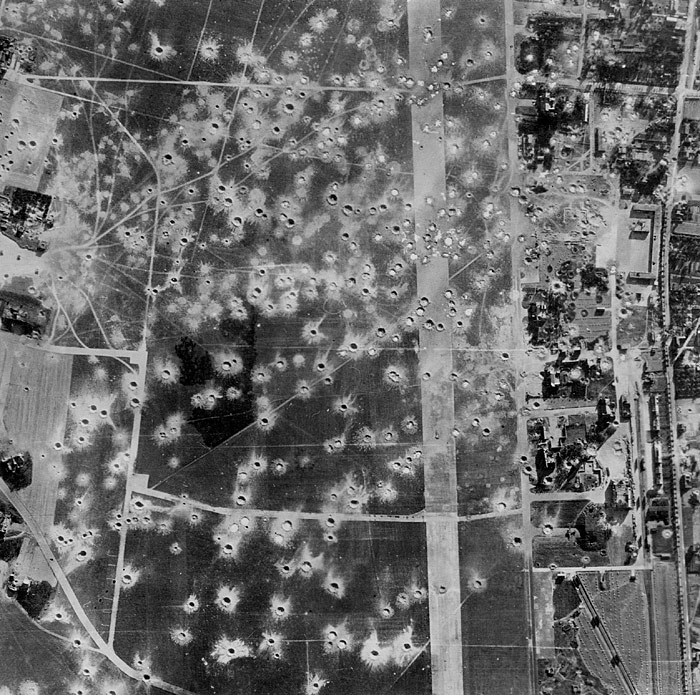 |
|
Greater Damage at St Trond-Brustem
|
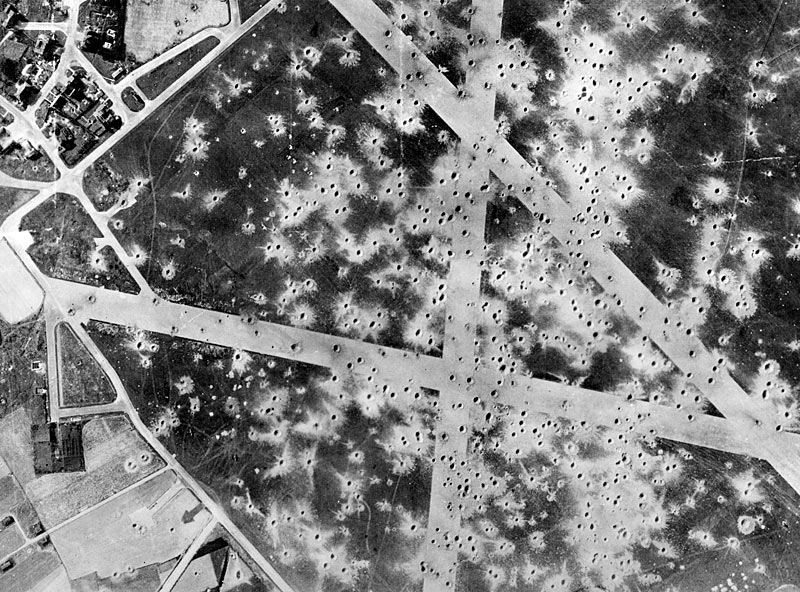 |
|
Carrying Paratroopers to the Invasion
|
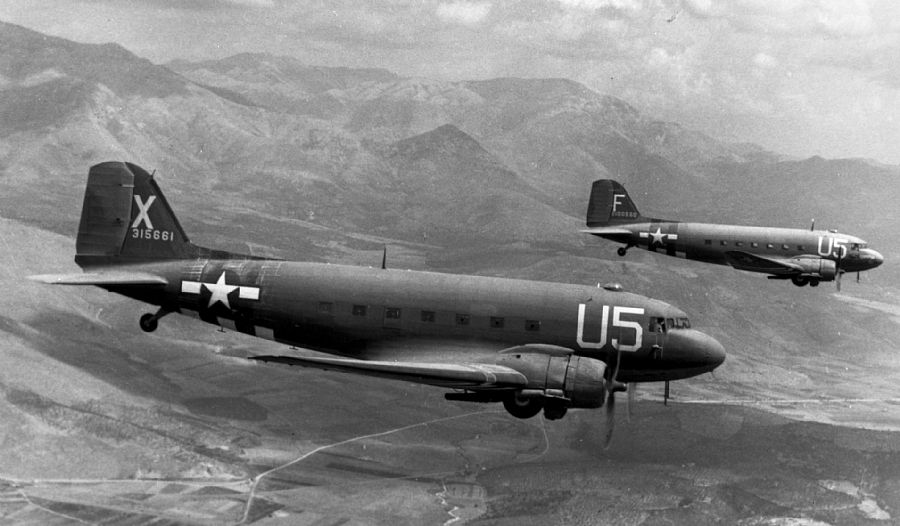 |
|
Airborne Troops Jumping into Southern France
|
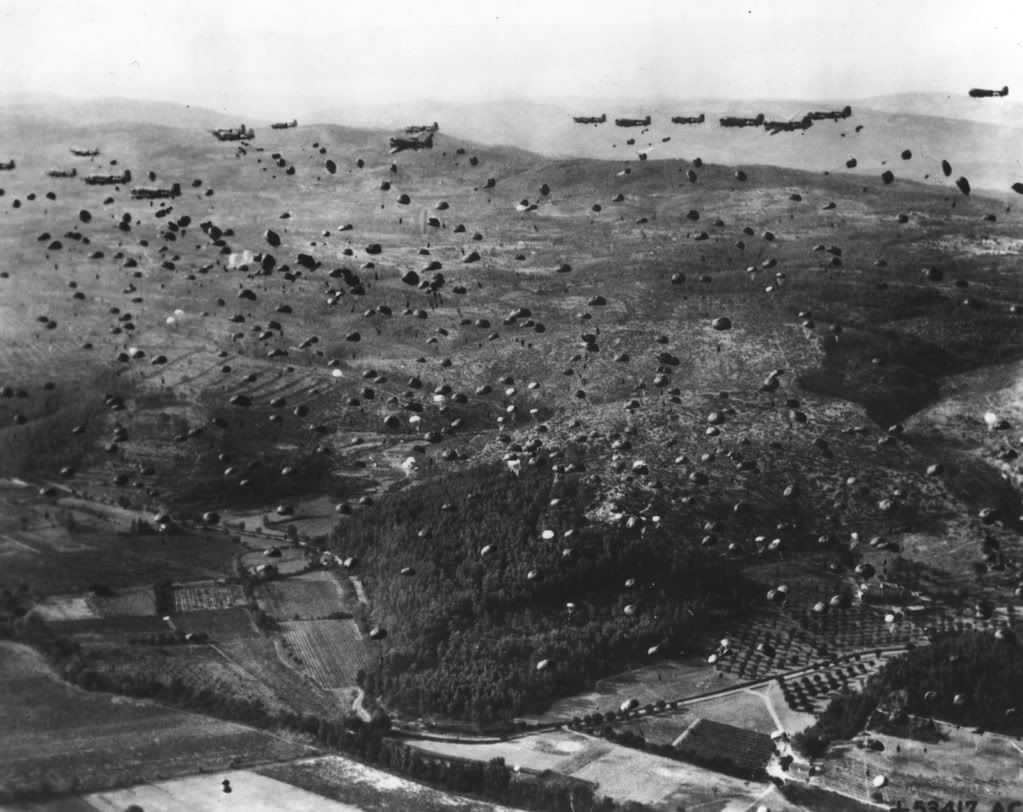 |
|
3rd Infantry Division Disembarking from LCI(L)
|
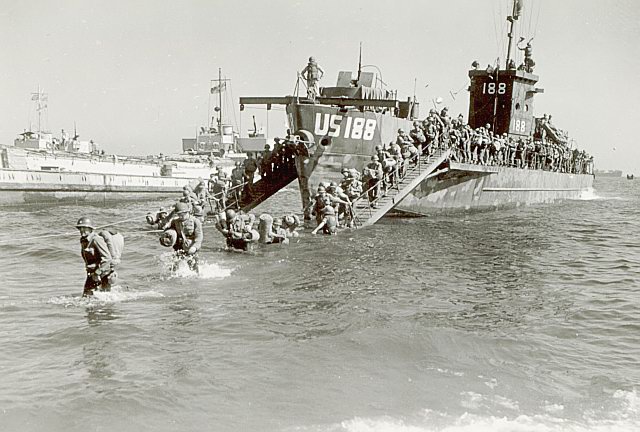 |
|
36th Infantry Division Landings at Saint Raphael
|
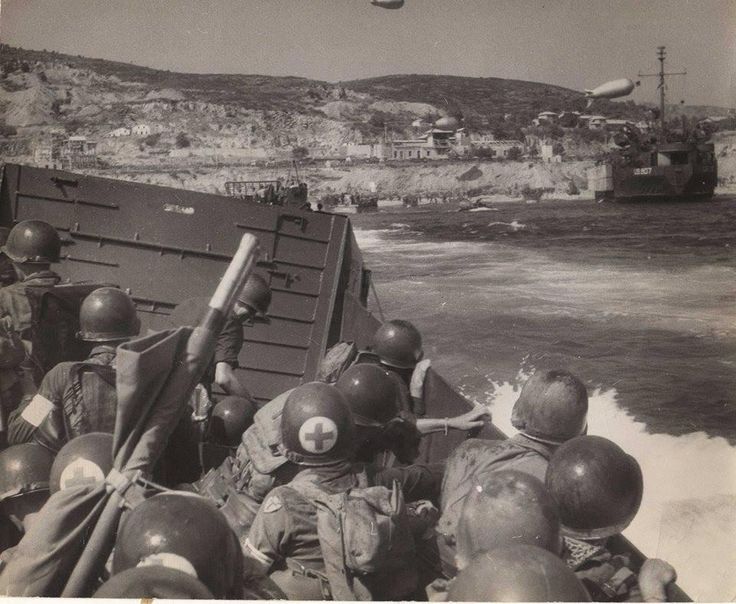 |
|
US and UK Paratroopers Take Break
|
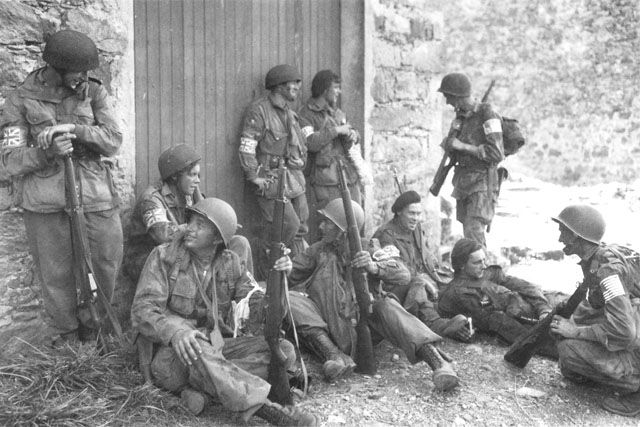 |
|
Landing Craft on the Beaches of Southern France
|
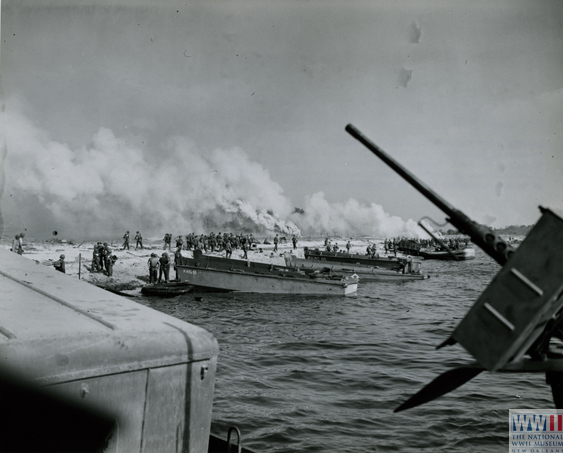 |
|
View from a Landing Craft
|
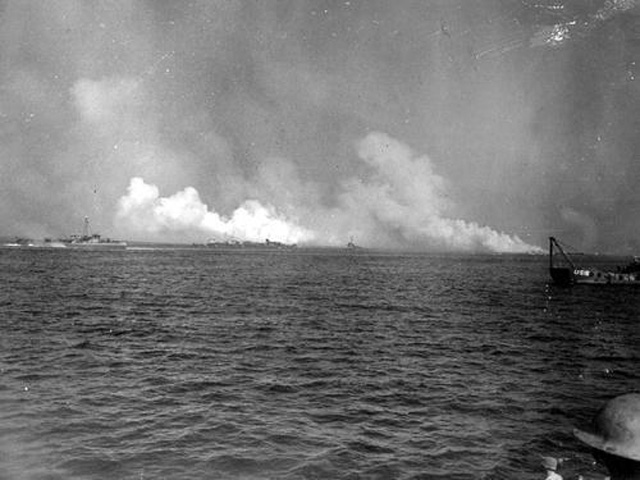 |
|
Landing Ship, Tank Unloading
|
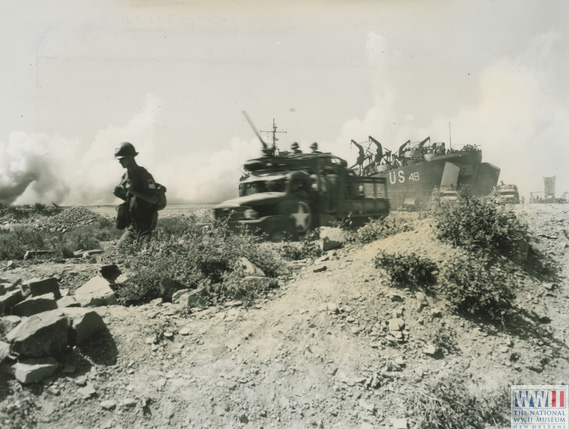 |
|
Cromwell Tank in Vassy, France
|
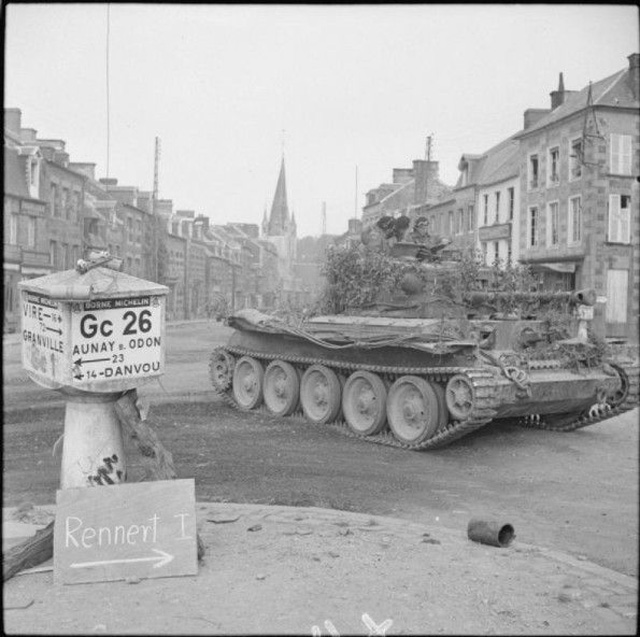 |
|
German Prisoners Board US Landing Craft
|
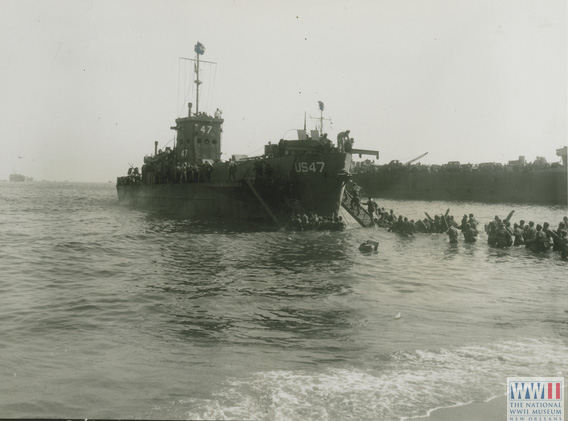 |
|
Resting Next to a Sherman Tank
|
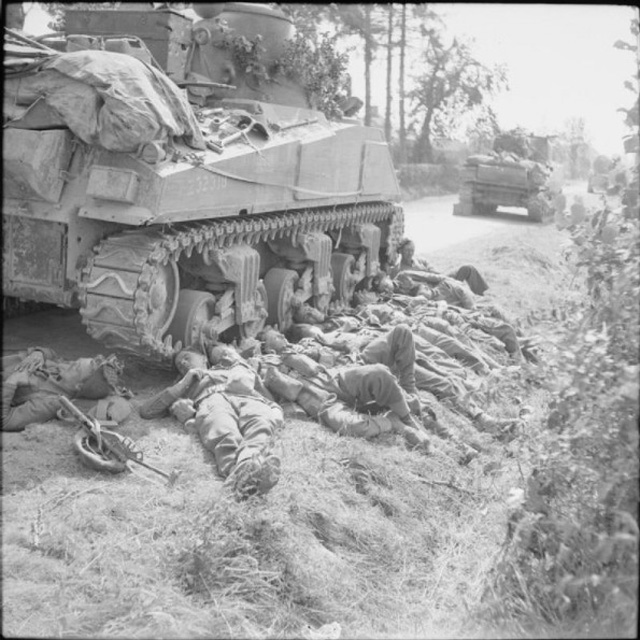 |
|
Sherman Tank Moving through Bois Holbout
|
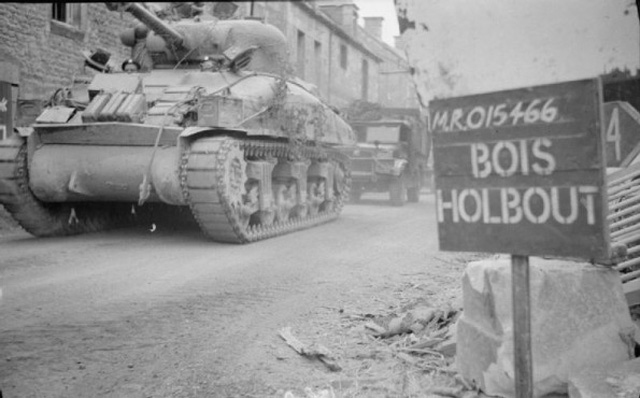 |
|
Attending to Wounded Soldiers
|
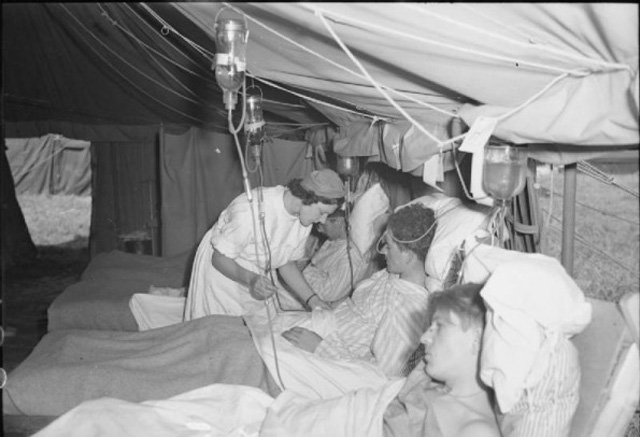 |
|
11th Armored Division Commanders
|
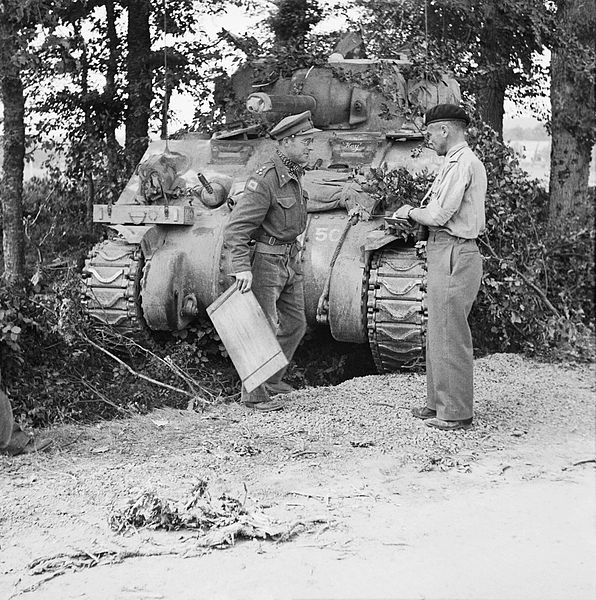 |
|
Wading to Shore from Landing Craft
|
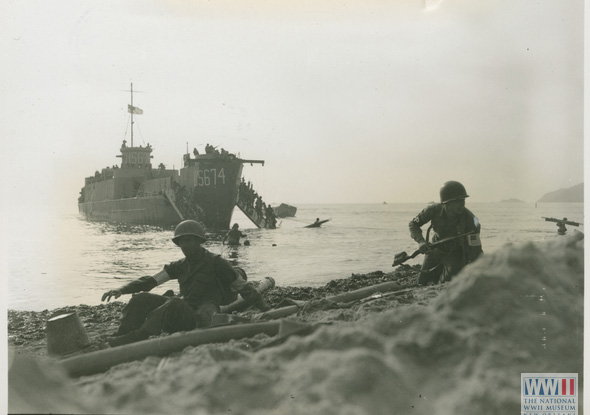 |
|
LCT-1141 Unloading at Saint-RaphaŽl
|
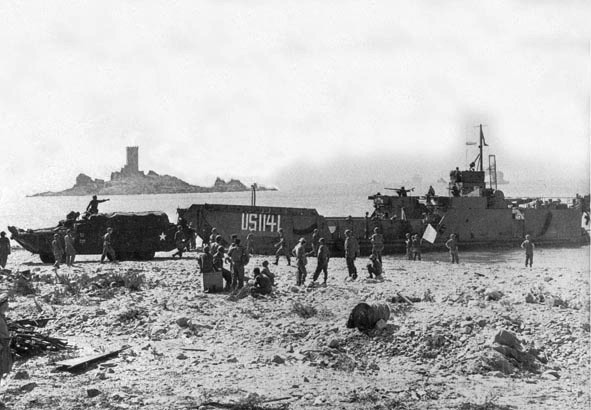 |
|
|

















